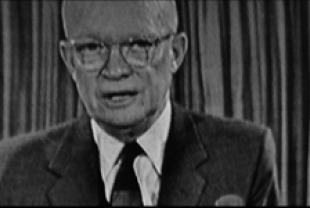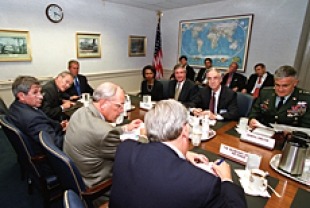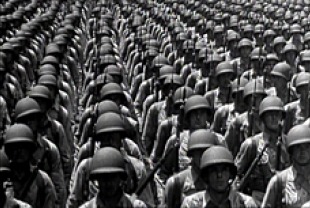The United States is a war-making nation and it seems as if it is already too late to turn back. Dwight D. Eisenhower was a five-star general in World War II and during his Presidency various strategies were put in place that would be known as the Cold War against Communism. Three days before the end of his term of office in 1961, he gave a prophetic and poignant speech warning against the dangers of giving too much power and emphasis to "the military-industrial complex." He stated:
"In the councils of government, we must guard against the acquisition of unwarranted influence, whether sought or unsought, by the military-industrial complex. The potential for the disastrous rise of misplaced power exists and will persist. We must never let the weight of this combination endanger our liberties or democratic processes. We should take nothing for granted. Only an alert and knowledgeable citizenry can compel the proper meshing of the huge industrial and military machinery of defense with our peaceful methods and goals, so that security and liberty may prosper together."
Since that speech, both Republican and Democratic presidents have involved us in wars around the world in the name of freedom including Vietnam, Grenada, Panama, Somalia, and Iraq. The machinery of war has become our nation's leading industry and nearly 52 percent of all federal spending goes to the military budget. In this hard-hitting documentary Eugene Jarecki (The Trials of Henry Kissinger) examines the most important question that all of should be asking: why do we fight?
The filmmaker discovers that many issues are tangled up in this query including American imperialism, 9/11, President Bush's deception of the public about Iraq, Vice President Cheney and his former company Halliburton, smart missiles, the timidity of the media, and the gravy train of contracts given to large corporations. While ordinary citizens invariably answer that we go to war to defend and spread freedom around the world, after many of these same people reflect a little more, they express ambivalence about war. Mixed feelings are most vividly evident in an interview with Wilton Sekzer, a retired NYPD officer whose son died in the attack on the Twin Towers. Searching for a way to get back at the terrorists, this patriot came up with a project involving having his son's name painted on a bomb that fell in Iraq. But when Sekzer later learns that there was no connection between Iraq and what happened on 9/11, he feels betrayed by President Bush.
Jarecki also includes interviews with policy makers from the Left and the Right including Sen. John McCain, William Kristol (founder of the Neo-con think tank Project for the New American Century), Chalmers Johnson (an ex-CIA consultant), Richard Perle (former advisor to the Bush administration), and Lt. Gen. Karen Kwiatkowski (a critic of the ongoing military adventurism). Gore Vidal is on hand to criticize the country for being "the United States of Amnesia" where nothing is learned from past mistakes.
Perhaps the most telling point made in this wide-ranging documentary is about the power created through links between the military establishment, corporations, the media, and Congress. No wonder millions of America listen when these formidable institutions speak with one voice. Another point of view is hammered across in Why We Fight. Hopefully, it will ignite more citizen activism against more costly and unnecessary wars!
Special DVD features include a commentary by director Eugene Karecki and Colonel Lawrence Wilkerson; extra scenes; extended character featurettes; audience Q&A with the filmmaker; and a filmmaker TV appearance on "The Daily Show" with Jon Stewart and Charlie Rose.


